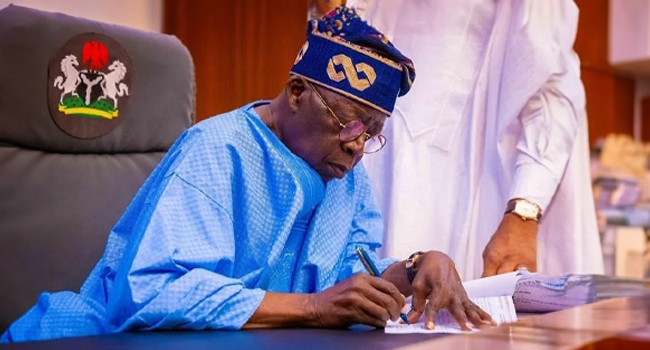In response to widespread concerns about hunger and hardship across the nation, the Federal Government has disbursed ₦570 billion to the 36 states to enhance livelihood support for their residents. President Bola Tinubu announced this development during a national address on Sunday, emphasizing the government’s commitment to alleviating poverty and boosting the economy.

The President also revealed that the Federal Government’s total fiscal revenue for the first half of 2024 amounted to ₦9.1 trillion, representing a substantial increase compared to the earnings under the previous administration. He highlighted the government’s efforts to enhancing revenue generation without imposing additional burdens on citizens.
“More than ₦570 billion has been released to the 36 states to expand livelihood support for their citizens, while 600,000 nano-businesses have benefited from our nano-grants. An additional 400,000 more nano-businesses are expected to benefit,” President Tinubu stated.
President Tinubu reported a significant reduction in Nigeria’s debt burden, with debt service revenue decreasing from 97 percent in 2023 to 68 percent in 2024. The government has successfully cleared legitimate outstanding foreign exchange obligations of approximately $5 billion, achieving this without disrupting any ongoing programs.
The President explained that this reduction in debt has granted the country greater financial freedom, allowing increased investment in critical social services like education and healthcare. He emphasized that despite Nigeria’s rich oil and gas resources, the previous administration had relied heavily on oil, neglecting gas resources while subsidizing fuel costs.
“Fellow Nigerians, we are a country blessed with both oil and gas resources, but we met a country that had been dependent solely on oil-based petrol, neglecting its gas resources to power the economy. We were also using our hard-earned foreign exchange to pay for and subsidize its use,” he explained.
To address this imbalance, the government has launched the Compressed Natural Gas (CNG) Initiative, aimed at powering the transportation economy and reducing costs. This initiative is expected to save over ₦2 trillion monthly, previously spent on importing petrol and diesel, and will free up resources for further investment in healthcare and education.
Additionally, President Tinubu expressed his readiness to engage with protesters involved in the nationwide protests that began on August 1, 2024. He reiterated the government’s willingness to address their concerns.
Regarding the revenue increase in the first half of the year, the president attributed it to measures such as blocking leakages, introducing automation, and creatively mobilizing funds. He pointed out that productivity in the non-oil sector is steadily rising, taking advantage of opportunities in the current economic environment.
“In the past 14 months, our government has made significant strides in rebuilding the foundation of our economy to carry us into a future of plenty and abundance,” Tinubu remarked.
President Tinubu also announced plans to distribute one million conversion kits at minimal or no cost to commercial vehicles, which consume 80 percent of imported petrol and diesel. This initiative aims to cut transportation costs by approximately 60 percent and curb inflation.
“We have started the distribution of conversion kits and the setting up of conversion centers across the country in conjunction with the private sector. We believe that this CNG initiative will reduce transportation costs by approximately 60 percent and help to curb inflation,” Tinubu disclosed.
Despite being Africa’s largest oil producer, Nigeria relies on imported petroleum products due to its low refining capacity. While licensed individuals import diesel, the Nigerian National Petroleum Company Limited remains the sole importer of petrol into the country.
—






